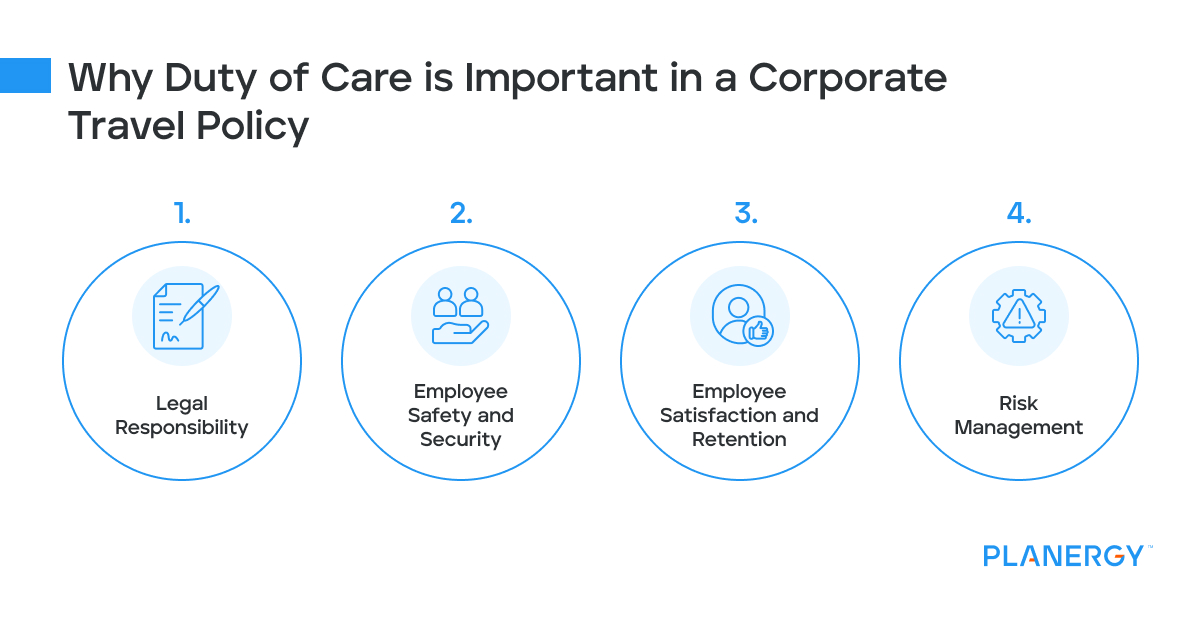Corporate travel has become essential to many companies’ operations in today’s fast-paced business world.
Employees are frequently on the move, whether it’s attending conferences, meeting clients, or visiting other branches.
This is where a well-designed corporate travel program comes into play.
In this blog post, we’ll discuss the basics of a corporate travel program, why it’s important, and how to implement one successfully.
We’ll also dive deeper into the differences between leisure and corporate trips, explain the benefits of corporate travel, and provide real-world examples.
Implementing a successful corporate travel program can significantly improve employee satisfaction, drive cost savings, and enhance overall business performance.
What Is a Corporate Travel Program?
A corporate travel program is a comprehensive set of policies and procedures governing business-related travel for employees.
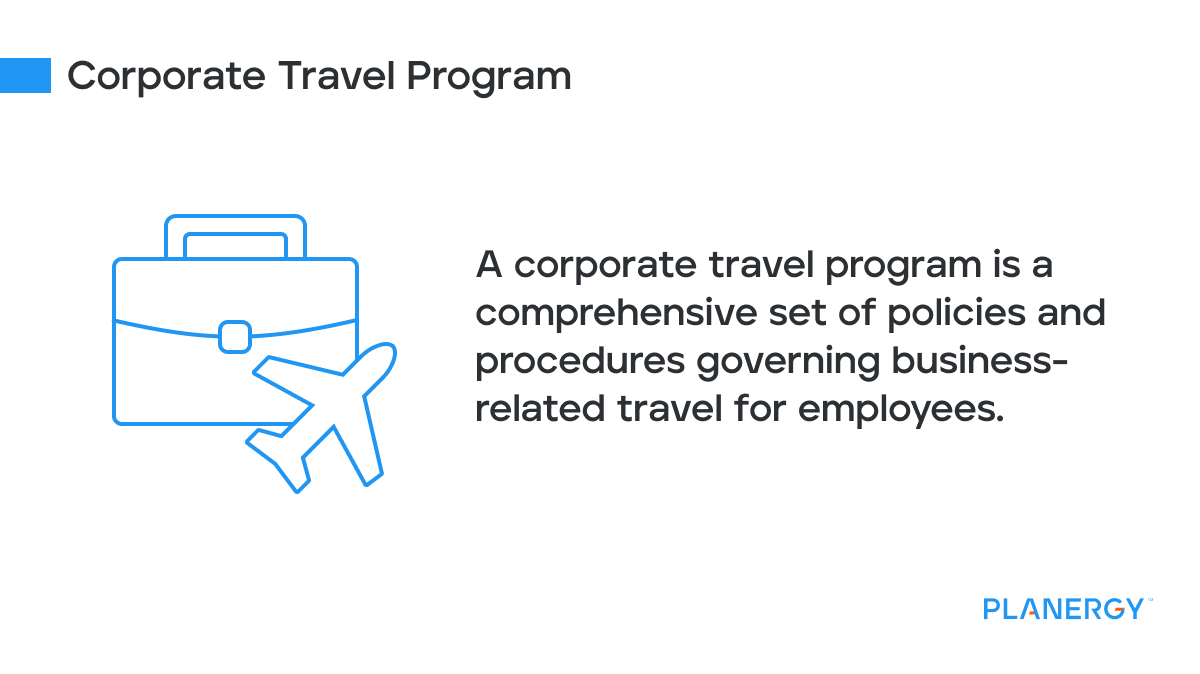
It outlines the rules and guidelines for booking flights, accommodation, transportation, and other travel-related expenses.
A well-structured corporate travel program helps businesses manage costs, ensure employee safety, and maintain a consistent travel experience.
Businesses can reduce administrative burdens, improve policy compliance, and optimize their travel spend by offering a centralized, streamlined approach to managing travel arrangements.
Why Is a Corporate Travel Program Important?
There are several reasons why having a corporate travel program is essential for businesses:
Cost Management
A well-defined travel policy helps companies control travel costs and optimize spending.
By establishing clear guidelines and budgetary limits, businesses can effectively manage their travel expenses and avoid unnecessary costs.
Additionally, partnering with preferred suppliers and negotiating volume discounts can lead to substantial realized cost savings.
Employee Safety and Security
The program ensures that employees travel with reputable providers and have access to support services during their trips.
A well-designed corporate travel program prioritizes employee safety by vetting travel suppliers, providing travel risk management resources, and offering 24/7 support for travelers in case of emergencies.
Compliance and Accountability
A corporate travel program enforces adherence to company policies and regulatory requirements.
Businesses can ensure that employees comply with internal and external regulations by centralizing the travel booking process and establishing clear procedures.
This reduces the risk of non-compliance penalties and enhances the overall company reputation.
Efficiency
Streamlining the travel booking process saves time and resources for both employees and the company.
Employees can quickly and efficiently make travel arrangements that align with company policy by implementing a user-friendly booking platform and offering personalized travel options.
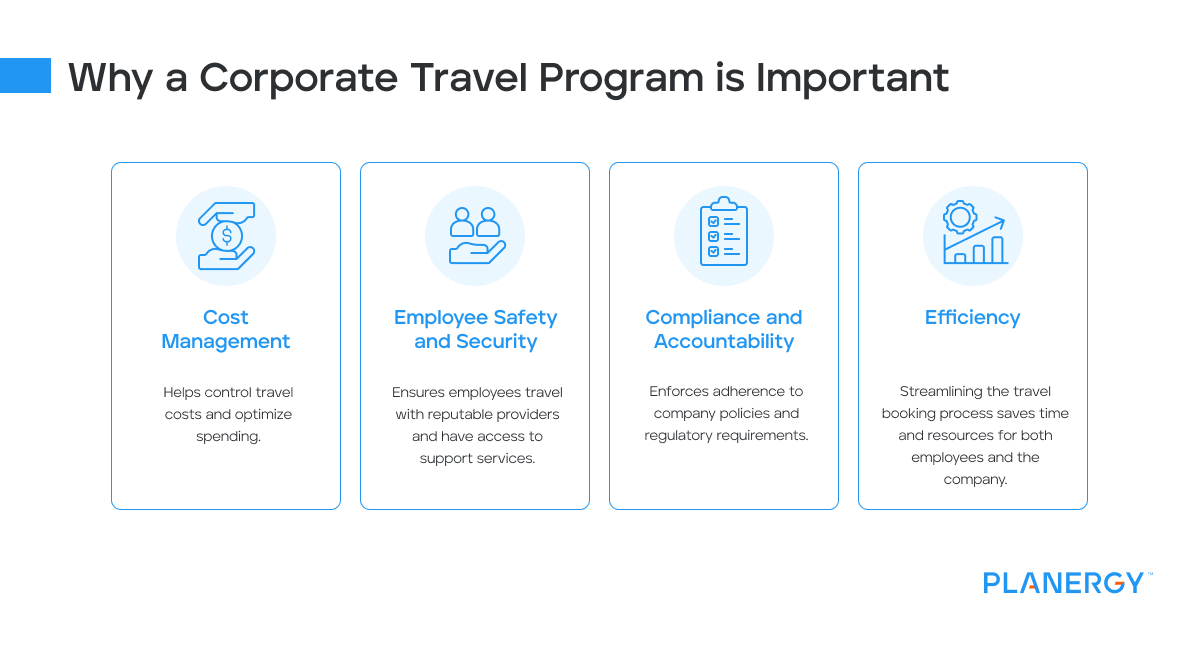
How to Implement a Successful Corporate Travel Program
Creating your business travel program requires careful planning, and input from multiple departments. Follow these steps to help.
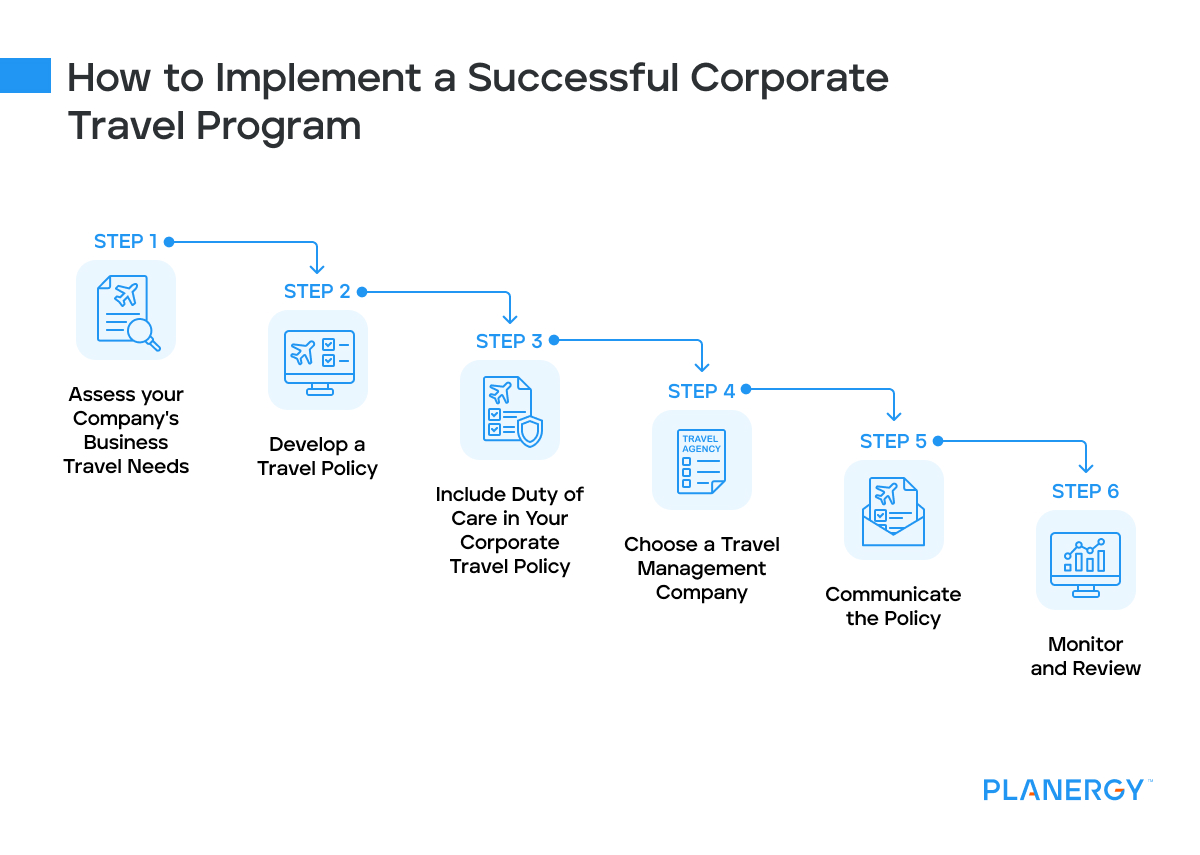
Assess your Company’s Business Travel Needs
Before developing a travel program, it’s essential to determine the frequency and types of trips your employees take, as well as their preferences and priorities.
Conduct surveys, analyze past travel data, and consult with key stakeholders to gain insight into your organization’s unique travel needs.
Develop a Travel Policy
Your travel and expense policy should include a clear breakdown of booking procedures, travel expenses allowed, and reimbursement methods.
Explain the reasons behind each rule and how it fits into the company’s compliance standards, and why it matters for traveler safety.
Creating your policy document is a crucial step in setting up a successful business travel program, as it will help ensure that all employees understand the expectations and guidelines related to their travels.
Furthermore, having a comprehensive travel policy can minimize confusion and potential violations of company standards, while making travel and expense management easier.
Your policy should include information such as:
- Requirements for pre-trip approval and notifications
- Per diem guidelines, including rules about meals, snacks, and entertainment expenses
- Rules around lodging and transportation (e.g., preferred vendors or travel agencies or allowed methods of travel, maximum airfare allowance)
- Restrictions on the use of personal funds or credit cards to cover business costs
- Reimbursement process and timeline
Include Duty of Care in Your Corporate Travel Policy
Duty of Care is an employer’s legal and moral obligation to ensure their employees’ safety, security, and well-being while traveling for business purposes.
In a corporate travel policy context, Duty of Care encompasses various measures companies take to protect their employees from potential risks and hazards during their trips.
Why is Duty of Care Important in a Corporate Travel Policy?
There are several reasons why Duty of Care is a crucial aspect of a corporate travel policy:
Legal Responsibility
Employers must take reasonable steps to protect employees from foreseeable harm while traveling for work.
Failure to fulfill this responsibility can result in lawsuits, financial penalties, and company reputation damage.
Employee Safety and Security
By prioritizing Duty of Care, employers can help minimize the risks associated with business travel, such as accidents, illnesses, or security threats.
This not only protects employees but also reduces potential disruptions to business operations.
Employee Satisfaction and Retention
Demonstrating a genuine concern for employee safety and well-being can increase job satisfaction, loyalty, and retention.
Employees are more likely to remain with a company that takes their safety seriously and provides appropriate support during business trips.
Risk Management
A robust program enables companies to proactively identify, assess, and mitigate travel-related risks. This helps prevent incidents from escalating into crises and ensures that employees receive timely assistance in case of emergencies.

To effectively integrate Duty of Care into a corporate travel policy, companies should consider the following measures:
- Establish clear guidelines and procedures for assessing and mitigating travel risks, including health, safety, and security concerns.
- Implement a travel approval process that considers the potential risks associated with each trip and ensures employees have the necessary resources and information to travel safely.
- Provide employees access to a 24/7 support service, such as an emergency hotline or assistance app, to address any concerns or issues during their trip, such as flight cancellation or illness.
- Offer pre-travel training and resources to educate employees on safe travel practices, personal security measures, and health precautions.
- Regularly review and update your Duty of Care program to ensure it remains effective and responsive to changing travel conditions and employee needs.
Choose a Travel Management Company
Partner with a TMC to help manage your travel program, negotiate supplier contracts, and provide support services for travelers.
A TMC can offer valuable industry expertise, access to discounted rates, and advanced technology solutions to streamline the travel process.
Your TMC can also access up-to-date information on travel advisories, local laws, and cultural norms.
Communicate the Policy
Ensure all employees know the travel policy and understand their roles and responsibilities.
Provide training sessions, distribute written materials, and maintain open lines of communication to encourage policy adherence.
Monitor and Review
Regularly evaluate the effectiveness of your travel program and make adjustments as needed.
Collect employee feedback, analyze travel data, and stay informed about industry trends to continuously improve your program.
Leisure vs. Corporate Travel
While leisure travel focuses on relaxation and enjoyment, corporate travel serves a business purpose.
Corporate trips often involve tight schedules, meetings, and specific goals, while leisure trips prioritize personal interests and activities.
Corporate travel policies must address unique challenges, such as managing costs, ensuring employee safety, and providing efficient booking processes.
Moreover, corporate travel programs must balance the needs of the business with the comfort and well-being of employees, creating a positive travel experience that supports productivity and engagement.
Companies of all sizes can benefit from a travel management solution.
Benefits of Corporate Travel
Corporate travel offers several benefits for businesses:
Networking Opportunities
Attending conferences and events lets employees network with industry peers and potential clients.
These connections can lead to new partnerships, collaborations, and business opportunities that drive growth and innovation.
Cost Savings and Productivity Gains
Using corporate travel programs can help reduce costs, as companies can negotiate discounts on airfare, hotel stays, and car rentals.
Additionally, employees who can book their travel through an easy-to-use online booking tool or mobile app save time compared to manual booking processes and get a better overall user experience.
Companies also benefit from productivity gains when employees avoid long lines at the airport or stress from last-minute travel plans.
Professional Development
Business trips provide opportunities for training, skill development, and staying up-to-date with industry trends.
Employees can gain valuable insights, knowledge, and expertise that translate into improved job performance and increased value to the company.
Improved Collaboration
Face-to-face meetings can help strengthen relationships and facilitate better communication among team members.
By bringing employees together in person, companies can foster teamwork, enhance collaboration, and ultimately improve overall business performance.
Increased Sales
Meeting clients in person can lead to stronger relationships and increased sales opportunities.
Face-to-face interactions allow for a deeper understanding of client needs, more effective presentations, and, ultimately, more successful business deals.
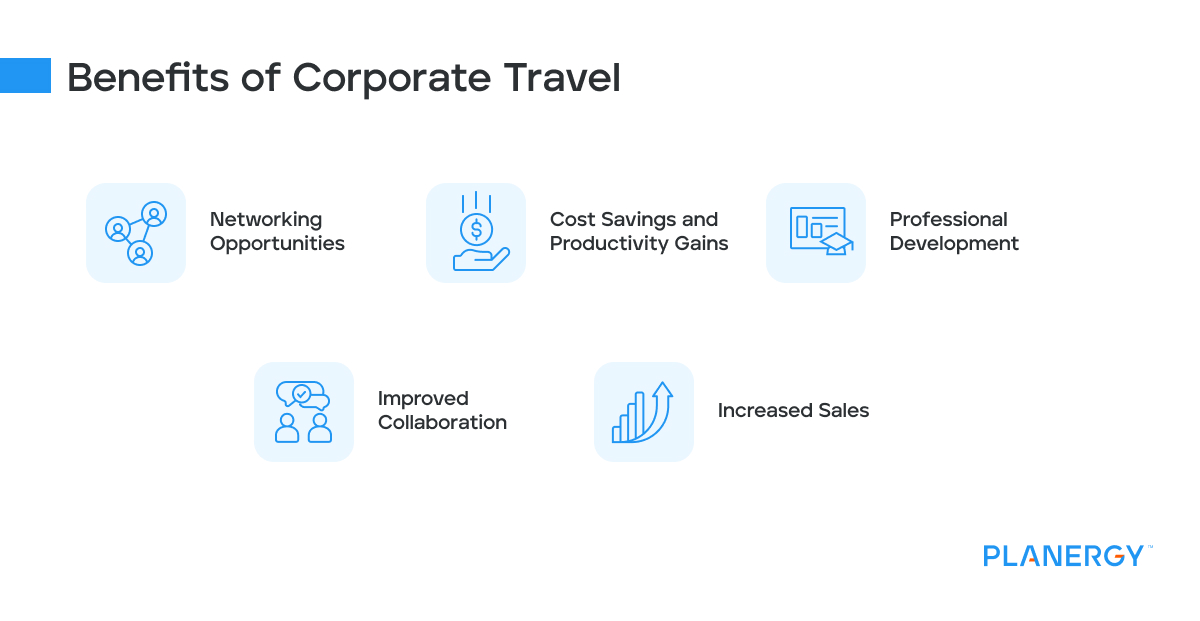
Roles and Responsibilities of a Corporate Travel Consultant
A corporate travel consultant is responsible for managing a company’s travel program.
Their duties include:
Negotiating Rates and Contracts with Travel Suppliers
An experienced corporate travel consultant will leverage their industry knowledge and relationships to secure your organization’s best possible rates and terms.
Assisting Employees with Travel Bookings and Arrangements
A corporate travel consultant acts as a liaison between employees and travel suppliers, helping to coordinate itineraries, manage changes, and ensure a smooth travel process.
Providing Support Services for Travelers, such as Itinerary Changes and Emergency Assistance
In the event of unforeseen circumstances or emergencies, a corporate travel consultant can provide critical support to employees, such as rebooking flights, arranging alternative accommodations, and offering guidance on local resources.
Analyzing Travel Data to Identify Cost-Saving Opportunities and Policy Improvements
By examining travel data and trends, a corporate travel consultant can recommend strategies for reducing costs, improving compliance, and enhancing the overall travel experience.
Tips to Create an Effective Managed Travel Program
To create a comprehensive corporate travel policy, consider the following tips:
Involve Key Stakeholders
Involve key stakeholders, such as HR, finance, and department heads, in developing your travel policy.
This ensures that the policy aligns with company objectives and addresses the needs of various departments.
Set Clear and Realistic Expectations
Set clear and realistic expectations for employees regarding travel expenses and reimbursement procedures.
Provide guidelines on acceptable expenditures, preferred payment methods, and required documentation to streamline expense reimbursement.
Regularly Review and Update your Travel Policy
Regularly review and update your travel policy to ensure it remains relevant and effective.
Stay informed about industry trends, regulatory changes, and evolving employee needs to make appropriate adjustments.
Encourage Employees to Provide Feedback
Encourage employees to provide feedback on their travel experiences to help identify areas for improvement.
By listening to and addressing employee concerns, you can create a corporate travel program that supports both business objectives and employee satisfaction.
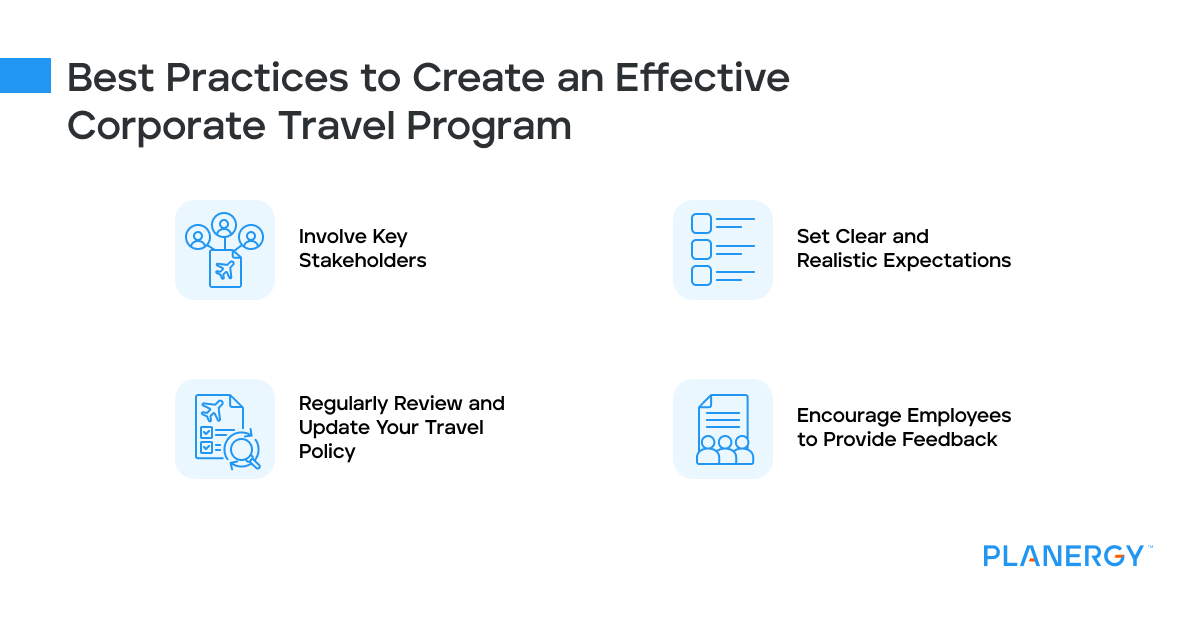
Final Thoughts
By following these steps and tips, you can create a corporate travel program that benefits your company and employees alike.
Using the right business travel management tools, like PLANERGY’s travel and expense management software, can help greatly.
With a well-implemented travel policy in place, you’ll be better equipped to manage costs, ensure employee safety, and optimize your business travel experience.


